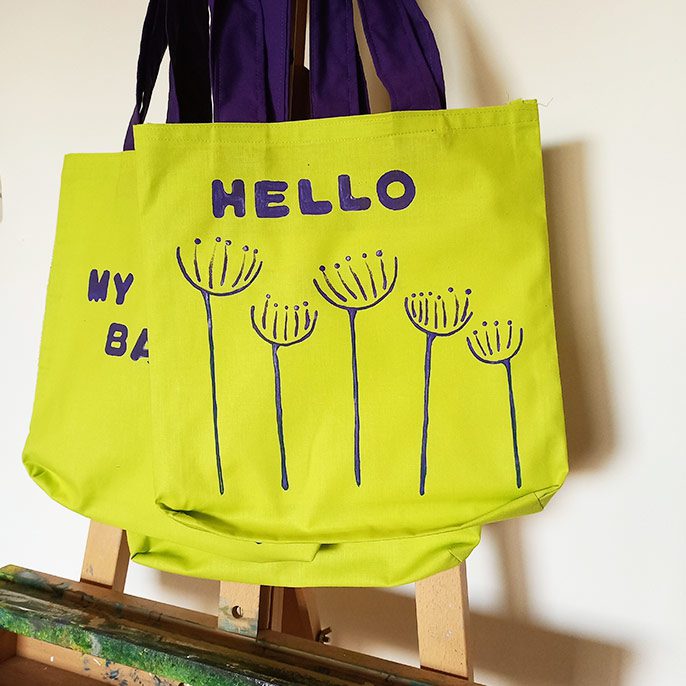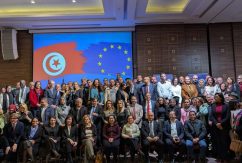Entrepreneur turns discarded items into valuable pieces !
At a time when fast fashion has become the norm, a Jordanian entrepreneur is taking the time to give a new life to worn-out items. With the support of the EU-funded INNOMED-UP project, Yusra Al Ja’bari has launched an initiative to turn leftover fabric and material into valuable artistic pieces, thereby promoting the importance of a circular economy and sustainable development.
In the province of Irbid, in northern Jordan, an EU-funded project is bringing the topics of circular economy and conscious consumption to the table. Implemented as part of the EU programme ENI CBC “Mediterranean Sea Basin Programme”, the INNOMED-UP project is promoting upcycling through innovation and education for Mediterranean cities’ creative industries.
Having in mind the dramatic impact of waste production in Mediterranean cities, much of which is produced by cultural and creative Industries, the project focuses on the involvement of 60 Small and Medium Sized Entreprises and over 3,000 individuals in circular economy schemes.
In Irbid, more than 38 entrepreneurs and small businesses have benefited from the project’s support, allowing them to regain means of stability following the COVID-19 pandemic. Obyda Hummash, General Manager of Future Pioneers, the local NGO in charge of implementing INNOMED-UP in Jordan, explains: “this project came at the perfect time, on top of our existing efforts to improve the lives of vulnerable groups here. It provided a unique opportunity to support individuals who had lost their registered businesses due to the pandemic.”
The project offered subgrants to a variety of beneficiaries, including women working from home, universities and small businesses. All had come up with innovative ideas to contribute to the circular economy within their local community. “The projects we supported were as diverse as the imaginations of the entrepreneurs involved. Some were impressively groundbreaking,” Obyda remembers, citing projects dedicated to recycling bees waste, wood, glass and banana leaves, among many others.
“There was even one that turned used clothes and cement into water fountains. I have to admit that it was really weird for me but it was so innovative!,” the project manager recalls.
In addition to providing them with specialists’ tools such as heat-pressing tools or sewing machines, the project delivered 12 days of dedicated training and mentorship, tailored to the specific needs of the participants.

An artistic twist to sustainability: creative upcycling
One of these trainees is Yusra Al Ja’bari. Jumping from one topic to another, Yusra has the emblematic personality of a creative artist. With a contagious dynamism, the Jordanian woman explains: “even though I am not so young anymore -I am turning 39- I feel like a young mind! I always have new ideas and a creative and curious mind. For me, this opportunity was perfect.”
With INNOMED-UP, Yusra found a way to channel this bubbling energy, allying her artistic focus with her sister Bushra’s expertise in sewing and designing. “As an artist, I always felt a strong attachment to my belongings and I never liked the idea of throwing things away, especially clothes. With the support of INNOMED-UP, I managed to come up with the best way to keep these clothes alive and give them a new added value,” Yusra explains.
She submitted a proposal to refashion and reuse old clothes and discarded fabric by turning them into fashionable and functional items like tote bags, home decors or plant pots.
As she attended the INNOMED-UP training, Yusra says she gained a much deeper understanding of environmental sustainability and became fascinated by the circular economy. “I learned to fine tune my work in order to best utilise fabric waste. I started to collect leftovers from everyone around me. It was all about minimising production waste and maximising the value of each piece,” the creator stresses, noting that by repurposing old textiles and incorporating them into her creations, she reduced the need for new raw materials.
She says the training also helped her to learn about market linkages and marketing strategies, “which have been crucial in promoting my products and getting more people interested”.
For Obyda, INNOMED-UP is not only a one-off financial aid, but rather a support to long-term growth and sustainability for the entrepreneurs. She emphasises, “we believe in building lasting relationships with our beneficiaries. We provide follow-up mentorship, assist them with communication and marketing, and even organise exhibitions to showcase their products.”
Future Pioneers’ branch in Irbid has now become an information point for new entrepreneurs, and a WhatsApp group created during the project keeps the communication alive between them all, fostering collaboration and continuous support among these creative minds.

A sustainable mindset: efforts to inform
While Yusra’s business has gained traction among her friends and family through social media, she aspires to reach a much wider audience. Despite the difficulty of promoting sustainable practices, especially in villages around Irbid, she remains hopeful.
“Yes, we need more time. We need more campaigning. And I know that I cannot reach all these people by myself, but at least now I know how to better convince people: by showing them the actual impact of dumping waste and the long-term danger of these behaviours,” Yusra explains.
With this mission in mind, she plans to engage with local Community Based Organisations and NGOs, in order to encourage people to keep their belongings or donate them rather than throwing them away.
By educating people about the detrimental effects of landfill waste and the benefits of creative recycling, Yusra is adamant that she can help inspire a change in mindset and promote a more conscious approach to consumerism.






























 Syria
Syria 


